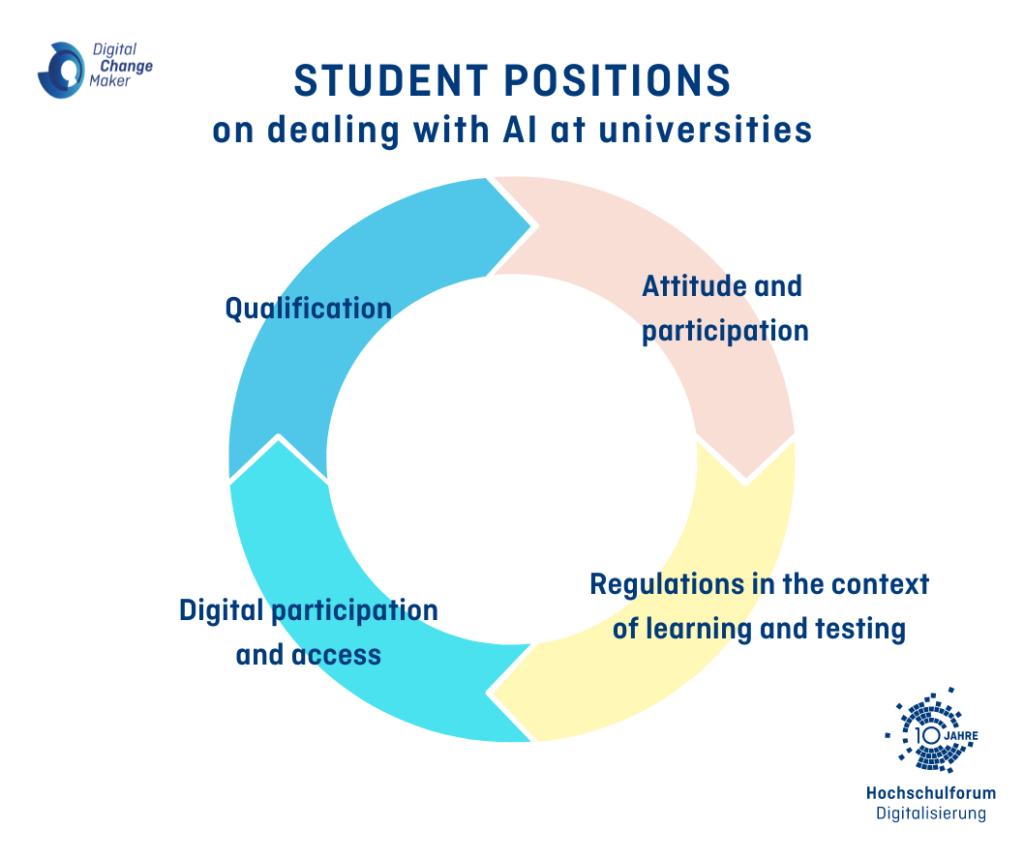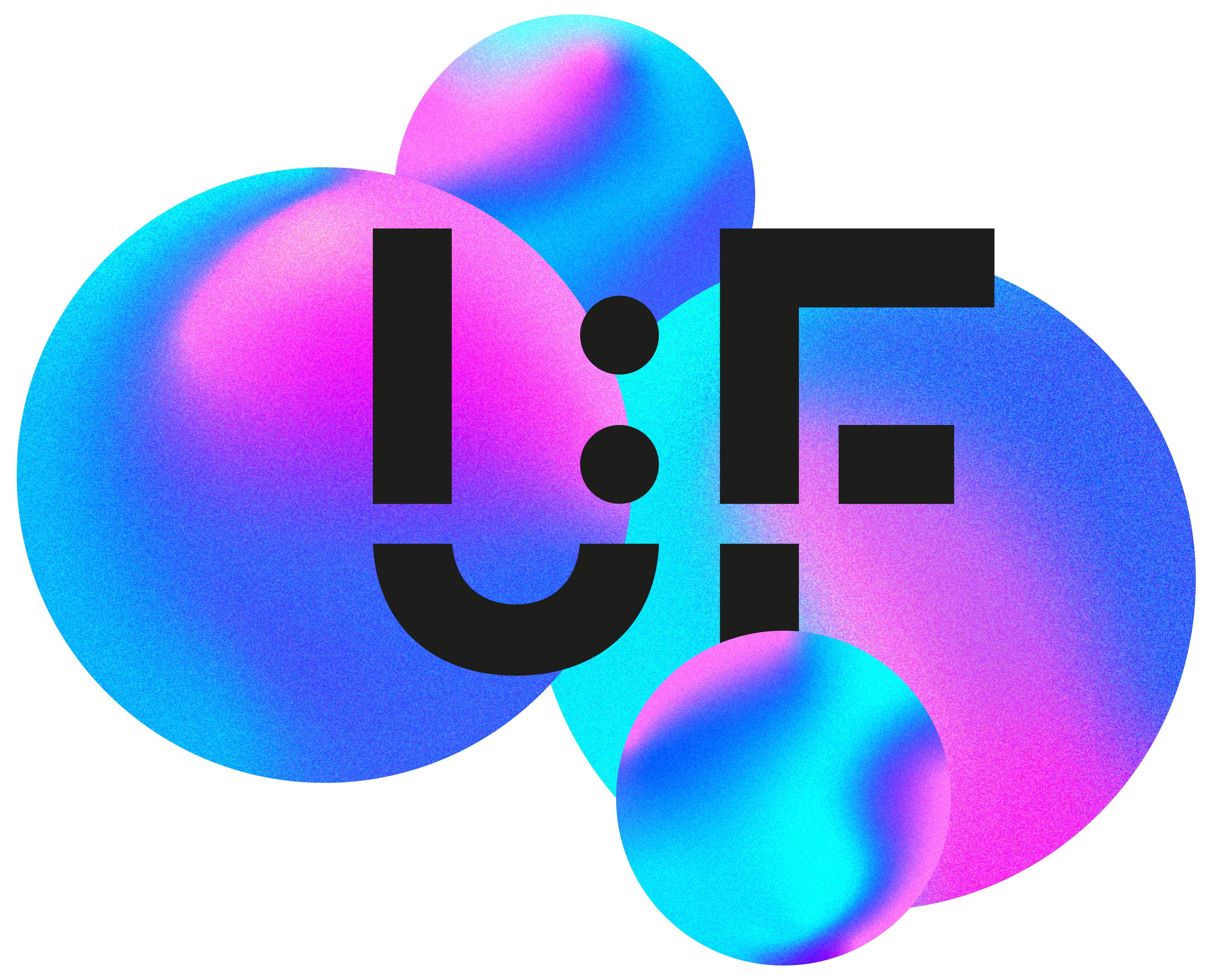DCM x AI-Sprint: Student positions on dealing with AI at universities
Artificial intelligence is changing the education sector enormously. Universities around the world are grappling with the question of what generative AI means for teaching, learning and testing at universities.
It it striking that the discourse is hardly characterized by student perspectives. Instead, there is often reproachful speculation about students and their use of AI tools. All too often, there is talk of “lazy and cheating” students who use AI to avoid doing their homework and fear a loss of skills. The fact that the use of AI is already a key skill on the current job market and should not be avoided is pushed into the background. The debate about student AI use and the opportunities and risks of tool use at universities is currently being conducted in a way that is not sufficiently reflective and forward-looking.
The HFD Innovation Hub aims to enrich this discourse with precisely this missing student perspective by actively involving students. We, six members of the DigitalChangeMaker-cohort 2023/2024 of the Hochschulforum Digitalisierung, are accompanied by the HFD team and AI experts from the HFD community in developing our own positions on AI in higher education in the AI Sprint and effectively introducing them into the discourse.
The „AI-Sprint“-process: What has happened so far
Our positions
AI is once again highlighting structural problems that have already become apparent during the coronavirus pandemic, as if under a magnifying glass. Nevertheless, too little is happening. In order to ensure the future viability of universities, we need the courage to tackle structural changes now. That is why we are first and foremost calling for a change of attitude!
As students, we are affected by the physical, digital and structural construction sites of German universities and the higher education system in our day-to-day studies. That is why we as students are publishing the following positions and demands on four particularly relevant topics in order to make our student voice clear, stimulate discussion and initiate change.
We want to start a conversation and shape things together. Our positions are therefore explicitly not finalized in terms of content, but represent a work-in-progress: We would like to sharpen and elaborate them together and enter into discussions with members of the HFD community and interested parties.
So: feedback, criticism and comments are expressly welcome – we look forward to hearing from you! Please feel free to use the contact form.

Position:
Due to the far-reaching implications for universities, for the world of work and for society, a constructive, progressive attitude towards AI at universities is imperative. We need a change of attitude: away from AI as a fear-monger and towards a constructive and progressive attitude that treats AI as an opportunity for a transformed university. This attitude must be developed across all status groups, become established throughout the university and be lived sustainably.
This requires an open culture of participation at universities, characterized by mutual trust and understanding, which enables discourse and cooperation on an equal footing. This should ensure that current design issues relating to AI, as well as future challenges and opportunities for the transformation of studying and teaching, are addressed jointly.
Low-threshold participation opportunities are also needed for participative structures, especially for students. They should be actively involved in the planning, implementation and evaluation of AI-supported learning formats from the outset.
We demand now:
We call on universities to understand and treat AI as an opportunity and to be guided by the following values when working on regulations, strategies and teaching and exchange formats:
1. Openness: to be prepared at all levels to engage in further education, to question one’s own role and to develop it further.
2. Community: students and teaching staff acquire new knowledge and skills together and learn from each other in order to shape change through constant exchange.
3. Constructiveness: We demand that the discourse is not characterized by pessimism, stagnation and a deficit attitude towards students, but that the exchange focuses on the will to change and the development of future-oriented skills and the needs of students.
We call for the medium term:
- We call on university leaders to have the courage to develop and commit to new future strategies for AI in higher education.
- We call on the departments to actively involve students in working groups and to recognize student expertise on AI by inviting students to express themselves critically and formulate wishes for dealing with AI.
- We call on university management and departments to establish spaces for discourse on AI in which students are involved, for example in the form of subject-specific and interdisciplinary task forces. Constructive change requires an open culture of participation characterized by mutual trust and understanding, which enables discourse and cooperation on an equal footing.
Justification:
The status quo among students and teachers in dealing with AI at universities is characterized by various uncertainties: students wonder whether they are “bad students” if they use AI and are afraid of disadvantages. Teachers doubt whether AI tools affect their department at all or fear that AI could jeopardize the necessity of their job (“So we won’t be needed at all then?!”). These uncertainties lead to uncertainty, stagnation and long-term disadvantages.
But AI is here to stay, even in everyday university life. We need to develop a common discursive stance that overcomes uncertainties on both sides through a productive exchange between all status groups and levels.
We want to be uncertain together, but not remain uncertain together: We want to encourage and enable students in particular to actively contribute their perspective and expertise with AI tools to university discourses.
Position
Clear, transparent rules for dealing with and using AI are needed – especially at course level – in order to give students security and enable constructive use in teaching. The rapid developments in the field of AI and implications for examinations make it clear that there is also a new urgency and opportunity to create a competence-oriented examination culture and to jointly tackle the revision of examination formats at universities, especially in academic writing.
KI also once again emphasizes existing issues in examination culture and examination formats. As students, we want examination formats that focus on learning and in-depth discussion and prepare us for practice. The use of AI in everyday life underlines this need and emphasizes the opportunity for a revision of current regulations.
We demand now:
- We call on university leaders to issue a paper (e.g. a guideline) that informs teachers and students about the scope for using AI in teaching. The regulations should provide orientation and clarity, not restrictions.
- We call on university management and departments to develop a communication strategy in order to communicate current developments and rules to the status groups in a target group-oriented manner. It makes sense to publish the rules transparently and uniformly on the communication channels used and to facilitate exchange about them.
- We require lecturers to make it transparent at all times and in one place for each course which use of AI is permitted and how this is to be declared.
- We call on lecturers to test and experiment with AI tools in their seminars and examination formats on the basis of the current legal possibilities.
We call for the medium term:
- We call on the Federal Ministry of Education and Research to set up a new funding line on the development and testing of new examination formats with AI or to cover this in an existing one.
- We call on the departments and university management, in cooperation with the students, to revise the university and subject-specific examination regulations in order to uniformly regulate and take into account the use of AI tools in examinations.
- We demand that lecturers in their departments revise their examination formats together with students in a participatory and learning goal-oriented manner.
Justification
The status quo paints a picture of inconsistent, non-transparent or completely absent regulations. The power to decide on the use of AI usually lies with the lecturers. This often leads to inconsistent, conservative or no regulations. Students suffer as a result. This is because a lack of clarity and direction causes great uncertainty and causes teaching, learning and discourse around AI at universities to stagnate. We students need room for maneuver and guidelines to which we can orient ourselves and to which we can refer.
The rapid developments in the field of AI and implications for examinations make it clear that there is also a new urgency and opportunity to create a competence-oriented examination culture and to jointly tackle the revision of examination formats at universities, especially in academic writing. All too often, academic examinations do not meet the target requirements. They do not test the competencies that are defined as learning objectives. AI makes these deficits even more apparent. We would like to see examination formats that focus on learning and in-depth discussion and prepare us for practice.
Position
We need an awareness of the barriers that AI can create and ways to minimize existing barriers with the help of AI. Access and qualifications are the basic prerequisites for the use of AI at universities; AI must not create any disadvantages. On the contrary, AI tools should enable greater autonomy and independence for disadvantaged people.
We demand now:
- We call on universities, the federal and state governments to provide free access to AI tools in order to create a level playing field for students. These should take data protection guidelines into account and be backed up with appropriate training courses on critical use.
- We call for universities to further expand workstations for PC and device rental so that the use of AI for students is not dependent on individual differences in access to devices.
- We call on all universities to define a plan of action on how AI technologies can be used to compensate for any disadvantages (e.g. subtitling, easy language, translation, etc.).
We call for the medium term:
- We call on universities to systematically increase equal opportunities and accessibility for all students through AI tools.
- We call on universities to constantly strive for AI that is as accessible as possible, i.e. to select the AI provided according to accessibility, among other things, and to critically check it again and again for accessibility.
- We call on universities to remain autonomous in the creation of access and not to become too dependent on commercial partners. To this end, we call on the federal and state governments to put a corresponding monetary value on these efforts. AI tools should be seen as one of many means and as a support rather than a replacement for human interaction.
- We call on the federal and state governments to create a funding line for participatory AI research with and for disadvantaged groups in order to take the needs of these groups into account and encourage them to use it.
Justification
We consider the use of AI to be a core competence. If not all students are given the opportunity to understand and (critically) apply AI tools during their education, they will be at a long-term disadvantage on the (international) job market. Existing inequalities and educational injustice are reinforced by a lack of access for all.
AI also offers the opportunity to lower the barriers to good higher education and allow more people to participate in higher education. For example, AI enables live subtitling of presentations for people with hearing difficulties or dubbed translations into easy language or other languages. Furthermore, AI opens up the possibility of switching between different modalities (having texts read aloud, writing spoken text, converting handwritten text into typed text).
Position
Students and teachers must be able to find their way in a world shaped by data and AI, to question it critically and to play an effective role in shaping their environment in personal, professional and civic matters
To do this, the various status groups need to acquire skills about the effects and limitations of AI, which must be achieved with the help of continuous training
We demand now
- We demand that universities offer all students the opportunity to take a course on the application of artificial intelligence. Teaching the basics of AI and its data basis as well as the critical use and reflection of various tools in a specialist context are central to this. Due to the dynamic developments in the field of AI, the application courses must be developed adaptively
- We call on all teachers to undergo further training on the topic of AI now
- We call on universities to create (monetary) incentive structures for teachers to encourage participation in AI qualifications
We call for the long term
- We demand that the federal states expand their higher education laws to stipulate the acquisition of AI skills in all degree programs throughout Germany
- We demand that the federal states set out the further education and training strategies (including the number of training participants and qualification measures) in their target agreements with the universities in order to explicitly anchor AI further training for teachers
- We call on the universities and departments to set up a transfer office for AI as a contact person and multiplier for teaching development, possibly in each department
- We demand that each department deals with the effects of AI on the practice of its subjects and degree programs and updates the courses and degree programs accordingly
- We call on universities to enable all students to obtain an additional certificate in AI
Justification
Some students adopt a passive attitude towards AI, preferring “to have nothing to do with it” Others use AI completely unreflectively and actually have unpleasant assignments written by AI Neither of these extremes is expedient – we need formats in which the essential basics are taught with the self-evidence of an introduction to academic work at the beginning of a degree course
A recently published study by the CHE shows that the majority of students are dissatisfied with the opportunities for acquiring skills in AI (https://www.che.de/download/check-ki-2024/)
Students
- identify with other students the status quo of dealing with AI at their own university and approach various organizational units of the university: are there already AI guidelines at my university? What regulations do the examination offices have for examinations?
- Share wishes, ideas, suggestions and criticism with the student representatives and actively encourage them to act as multipliers
- Actively engage with lecturers on AI and the student perspective
- try out and use AI tools as required and make visible how they can have a supportive effect
- Make barriers to the use of AI in studying and teaching visible
- e.g. set up a student AI task force to deal with the following possible areas of responsibility and positions: Organizing a lecture series, publishing own positions, opening and claiming discussion spaces, creating a communication interface with students (groups)
Teachers
- Be curious and open
- actively engage with students on needs and perspectives, share expertise with each other
- Further educate themselves in dealing with AI
- Evaluate the use of AI in teaching anonymously
- discard general suspicions of attempts to deceive through the use of AI
- get in touch with other lecturers, departments, institute and faculty management or Vice Presidents for Teaching and Studies
to find out about existing guidelines for teaching and examinations, to question these together and to test examination formats in combination with AI tools - Allow and support the use of AI in your own courses
- Demand and take advantage of further training opportunities offered by the university and public institutions (e.g. AI Campus)
Universities
- Understand AI at the university as an opportunity to empower all status groups with future-proof skills
- actively create spaces that support the exchange between different status group members
- be approachable for students and lecturers and proactively invite them to exchange formats
- provide free access to AI tools such as ChatGPT 4.0 for all university members
- Create further training opportunities and make them available to students and teaching staff at a low threshold
All status groups: get in touch with the DigitalChangeMakers to discuss content and formats!

Presentation of our demands at the University:Future Festival 2024 (German language)
Links to further information
About the DigitalChangeMaker initiative Further positions & demands of the DCMThis is us: The DCMs 2023/24 in the AI sprint

Inga Gostmann
Inga is studying Gender Studies (M.A.) at Bielefeld University. Inga Gostmann is studying Gender Studies at Bielefeld University and is a student project coordinator of the BiLinked project at the Center for Teaching and Learning at Bielefeld University and also a research assistant in the same project in the Community of Practice Public Humanities. As a DigitalChangeMaker, Inga is committed to student-centeredness and student mental health in addition to AI.

Lea Hildermeier
Lea is studying English and Educational Sciences (B.A.) at Bielefeld University. She works as a tutor at the Center for Learning and Teaching and has founded the voluntary university group LiLiGoesMental, with which she is involved in the field of (student) mental health.

Philipp Höhne
Philipp is studying Biological Chemistry (M.Sc.) at the TU Berlin. He is particularly interested in AI/digital technologies, internationalization as well as digital and hybrid learning concepts.

Gürcan Mustafa Özden
Gürcan is studying human medicine at Goethe University Frankfurt. He is particularly interested in student participation, digital and hybrid learning concepts and equal opportunities.

Kevin Saukel
Kevin is studying Educational Science and Business Informatics (B.A./B.Sc.) at Goethe University Frankfurt. He is particularly interested in student participation, accessibility and educational technologies.

Rosa Steffens
Rosa is studying Biochemistry and Molecular Biology (M.Sc.) at the University of Potsdam and is a student assistant at the Hamburg-based company COLIPI As a DigitalChangeMaker, she wants to support the university world in integrating AI technologies more strongly into teaching and making topics such as students' mental health more visible.

Expert in the AI sprint: Johannes Schleiss
Johannes Schleiss is a doctoral student in the Artificial Intelligence Lab at Otto von Guericke University Magdeburg and conducts research in the field of applied and digital training concepts for artificial intelligence (AI) and the use of AI technologies in education. He is also an Associate Research Fellow at the AI Campus, a PrüfungHochDrei Fellow for innovative examination formats, a Future Scout at the Stifterverband and supports the DigitalChangeMakers of the Hochschulforum Digitalisierung as an expert in the AI Sprint.
Your message to the DigitalChangeMakers
Share your thoughts with us!
The DigitalChangeMakers welcome your questions, suggestions, comments and requests for cooperation on the AI sprint and the demands for dealing with AI at universities.
Contact persons in the Hochschulforum Digitalisierung
 Yasmin Djabarian
Yasmin Djabarian
 Claudio Nigrelli
Claudio Nigrelli









